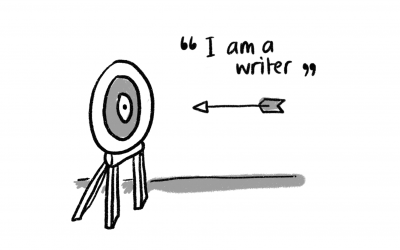When you experience negative thinking about your writing, you’re really just facing your own biased and ungrounded assumptions about your abilities. Whilst there’s nothing wrong with holding yourself and your writing to high standards, having negative thoughts can dent your confidence and lead to bouts of pessimism and inactivity if they’re left unchecked. But there’s a way to turn your negative thoughts into more positive ones if you follow these steps based in Cognitive Behavioural Therapy that we use in our own coaching programs.
The first step towards conquering negativity and quelling your chatterbox mind is to recognise the types of thoughts you experience as they occur. We’ve found eight types of negative thinking that affect writers. How many do you recognise?
1. Mind-reading
Mind-reading thoughts impact you the most when self-esteem is low. You feel 100% certain that you know what someone else thinks about your work and this can lead to a loss of confidence. This in turn can lead to you talking yourself out of doing things because you believe you ‘know for sure’ what the outcome will be.
“I can tell that they don’t like my writing.”
“I know she thinks I’m not good enough. They didn’t like my work last time so they’re not going to like it this time.”
2. Generalising and filtering-out
When you have negative thoughts, sometimes you latch on to one small thing that might have gone wrong – such as a writing session not going too well or a piece of unwelcome feedback – and blow this up out of all proportion. At the same time you also filter out anything positive that might have happened and so reach an unrealistic, wholly negative conclusion.
“They didn’t like paragraph three so this must mean that the entire premise of my work is flawed.”
“I kept getting distracted in my last writing session – I’ll never finish if this keeps happening. It’s making me think I should give up.”
>> Read more: How to combat your inner writing critic and stop worrying
3. Polarising
This is a form of either/or thinking where there is little or no middle ground. This form of negative thinking often occurs when writers compare their work to others. Either you think you’re ‘good’ or ‘bad’ and conclude that if you can’t write like someone else then you’ll never achieve any success.
“If I don’t get a place on the course then I may as well throw in the towel.”
“This is my last chance. If I don’t get a good grade this time, then I’ll never make it.”
4. Calamitous
When you experience catastrophic thoughts about your writing you tend to think ‘what if?’ type thoughts and over-estimate the likelihood of calamity. These ‘what if?’ type anxieties are unfocused and make you feel out of control. They can lead to negative spirals.
“What if I never make it as a writer? I’ll never achieve my life’s ambitions.”
“It’s all going badly. Everything is wrong with the idea – it’s never going to improve.”
5. Inferring
Sometimes you infer that comments about someone else and their writing are actually a comment on you. You quickly jump to negative conclusions about your own progress or level of abilities without any evidence.
“She said they were making really good progress on their writing, they must think I’m not.”
“They never said anything good, so it must be all bad.”
6. Comparing (with a previous self)
Writers often compare their current progress – or lack thereof – with another time in their lives when they were able to accomplish more or found the writing process easier. You become overly self-critical and nostalgic for this productive time rather than simply accepting that your situation may have changed.
“Writing used to be easy – why am I finding it so hard now? Perhaps I can’t do it anymore…”
“I should be far further along than I am now – what am I doing wrong?”
7. Blaming
When you use blaming you unjustifiably hold someone, some thing or some situation responsible for the problems you may be experiencing with your writing. When you experience this form of negative thinking, rather than taking responsibility for your own actions, you feel like you’re the victim of a situation and this can be damaging.
“I would have never done that if they hadn’t told me to.”
“That feedback from a colleague has ruined my life.”
8. Blinkering
Sometimes you’re unwilling to take another’s point of view because you feel you are right. This type of blinkered thinking can lead to resentment brewing.
“I can’t see what they don’t like about my writing, there must be something wrong with them.”
“I don’t know why they can’t see what I’m trying to explain. They’re just not listening to me.”
Track and classify your negative thinking
It’s not unusual to have negative thoughts about your writing but it’s only by recognising them in yourself that you can start to address them and find a positive way forward. That’s why noticing your overly self-critical patterns of thinking marks an important first step towards overcoming them.
It might feel strange at first, but try keeping track of the negative thoughts you experience over the course of a day. Some writers like to carry round a notebook or log things on their phone just as they would for gathering ideas and inspiration. As you experience these thoughts, record then classify them into one of the categories above.
>> Read more: A guide to tracking your writing – why noticing how you write will transform your practice
Don’t judge – notice
As you track your thought patterns and assumptions, don’t judge yourself – now is not the time to start blaming yourself for any negativity you experience. You’re human – it’s normal to feel this way.
Simply notice and note down the thoughts that flow in and out of your mind as scientist might observe a specimen in a lab. By taking this simple action you might see that your negative thoughts begin to lose their power and influence over you.
>> Read more: How to combat your procrastination excuses and start writing
Don’t accept – question
Now you’ve noted down the types of negative thinking you experience ask yourself whether they’re true or not.
If a good friend came to you with a list of negative things they think about themselves you’d probably try to help by asking why and how they’ve reached that conclusion – do the same with yourself. It’s time to ask yourself for evidence. What grounds do you have for believing what you do? For example:
Thought > If I don’t get a place on the course then I may as well throw in the towel.
Question > Is that really true? Is throwing in the towel the only option to take or are there others?
Thought > I know she thinks I’m not good enough. They didn’t like my work last time so they’re not going to like it this time.
Question > How do you know? What evidence do you have to prove that they’re not going to like your work?
Thought > It’s all going badly. Everything is wrong with the idea – it’s never going to improve.
Question > Is absolutely everything going badly? Prove it. What evidence do you have that it will never get better?
Find the positive, but never force it
Remember that when you use this method, you’re not trying to force yourself to think happy thoughts about your writing instead of gloomy ones. Neither are you trying to prevent yourself from having negative thoughts through sheer force of will.
Rather, you’re trying to retrain your brain to you treat the negative assumptions you reach about yourself and your abilities as just that – assumptions – based on often faulty and biased opinions.
When our mood is low, it’s very easy to jump to the wrong conclusion about our writing and to generalise with sweeping statements. By noticing these assumptions in a non-judgemental way and then challenging them we can start to naturally turn negative thoughts into positive ones.




